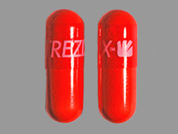Apap-Caffeine-Dihydrocodeine
Acetaminophen/Caff/Dihydrocod
What is Apap-Caffeine-Dihydrocodeine used for?
See also Warning section. This combination medication is used to help relieve moderate to severe pain. It contains an opioid pain reliever (dihydrocodeine), a non-opioid pain reliever (acetaminophen), and caffeine. Dihydrocodeine works in the brain to change how your body feels and responds to pain. Acetaminophen can also reduce a fever. Caffeine increases pain relief, especially for certain types of headaches.
CHEMICAL NAME
DRUG TYPE
Pain/InflammationApap-Caffeine-Dihydrocodeine Prices
Searching for the lowest prices
What does Apap-Caffeine-Dihydrocodeine look like?
View all Apap-Caffeine-Dihydrocodeine Image Information (1)Apap-Caffeine-Dihydrocodeine Frequently Asked Questions
See also Warning section.
Read the Medication Guide provided by your pharmacist before you start taking acetaminophen/caffeine/dihydrocodeine and each time you get a refill. If you have any questions, ask your doctor or pharmacist.
Take this medication by mouth as directed by your doctor, usually every 4 hours as needed for pain. You may take this drug with or without food. If you have nausea, it may help to take this drug with food. Ask your doctor or pharmacist about other ways to decrease nausea (such as lying down for 1 to 2 hours with as little head movement as possible).
The dosage is based on your medical condition and response to treatment. Do not increase your dose or use this drug more often or for longer than prescribed because your risk of side effects may increase. Properly stop the medication when so directed.
Pain medications work best if they are used as the first signs of pain occur. If you wait until the pain has worsened, the medication may not work as well.
This product contains caffeine. Avoid drinking large amounts of beverages containing caffeine (coffee, tea, colas), eating large amounts of chocolate, or taking nonprescription products that contain caffeine.
Suddenly stopping this medication may cause withdrawal, especially if you have used it for a long time or in high doses. To prevent withdrawal, your doctor may lower your dose slowly. Tell your doctor or pharmacist right away if you have any withdrawal symptoms such as restlessness, mental/mood changes (including anxiety, trouble sleeping, thoughts of suicide), watering eyes, runny nose, nausea, diarrhea, sweating, muscle aches, or sudden changes in behavior.
When this medication is used for a long time, it may not work as well. Talk with your doctor if this medication stops working well.
Though it helps many people, this medication may sometimes cause addiction. This risk may be higher if you have a mental/mood disorder or a substance use disorder (such as overuse of or addiction to drugs/alcohol). Take this medication exactly as prescribed to lower the risk of addiction. Ask your doctor or pharmacist for more details.
Tell your doctor if your pain does not get better or if it gets worse, or if you have any new pain.
IMPORTANT: HOW TO USE THIS INFORMATION: This is a summary and does NOT have all possible information about this product. This information does not assure that this product is safe, effective, or appropriate for you. This information is not individual medical advice and does not substitute for the advice of your health care professional. Always ask your health care professional for complete information about this product and your specific health needs.
